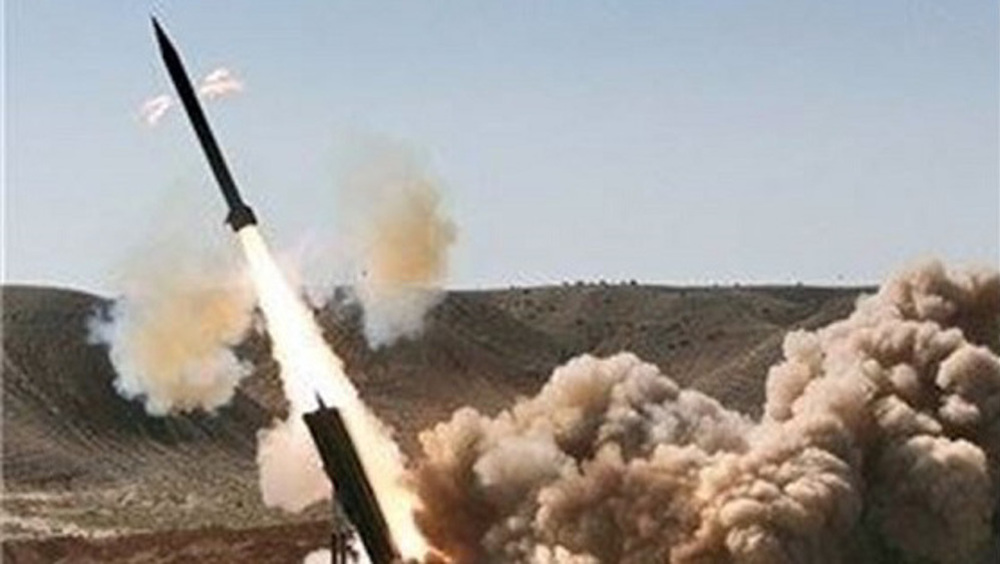Killing machine: How US arms are used by Israeli regime to kill Palestinians
By Ivan Kesic
More than five months into the Israeli genocidal war on the besieged Gaza Strip, the death toll of Palestinians has just crossed 31,000, with thousands more still trapped under the rubble.
Almost 14,000 of those killed by the Israeli military, using sophisticated American weapons, are children and approximately 9,000 are women. More than 72,000 others are wounded.
The vast majority of these people were killed in Israeli air strikes targeting civilian infrastructure, in which almost half of the cases involved unguided aerial bombs.
Information about the types of bombs used by the Israeli regime has been revealed by the US Office of the Director of National Intelligence, and their effect on the population and infrastructure of Gaza is also known to the US intelligence apparatus and the government.
However, the Joe Biden administration has continued to supply lethal weaponry to the Benjamin Netanyahu regime in Tel Aviv, ignoring growing calls worldwide, including by the International Court of Justice (ICJ), for a halt to arms shipments to Israel.
Observers have questioned the decision by the Biden administration to airdrop aid over Gaza, which killed five people a few days ago while continuing to provide fuel to the Israeli killing machine.
Arms transfers in numbers
Exact figures for specific weapons deliveries have not been officially released by either the US or the Israeli regime, but rough estimates can be made based on occasional disclosures of various details.
A report published by the Washington Post on Wednesday, based on statements from current and former US officials, revealed that the Biden administration has arranged "over 100" individual arms transfers to Israel since the start of the latest war on October 7 last year.
The previously unreported triple-digit figure includes thousands of precision-guided munitions, small-diameter bombs, bunker busters, small arms and other lethal aid, US officials were cited as saying to members of Congress in a classified briefing.
These officials, speaking on the condition of anonymity, also criticized the massive delivery of firepower because, except for two transfers, it was done without individual notification to Congress and without public debate.
The only two previously publicly disclosed military sales totaled over $100 million individually, while at least a hundred others were carefully stuffed within that figure due to congressional notification rules.
Section 36 of the US Arms Export Control Act requires Congressional notification for Foreign Military Sales (FMS) of any defense articles or services valued at $100 million or more, in the case of the Israeli regime, NATO member countries, and four other US allies.
US State Department spokesman Matt Miller was quoted as saying that rules were followed and since the beginning of the war, US officials have "engaged Congress" on arms sales to Israel "over 200 times."
The massiveness of military transfers is also evidenced by earlier leaked information, such as the US Defense Department's statement in mid-November that deliveries of bunker-buster munitions and missiles to Israel take place on a "near-daily basis."
That same month, the US House of Representatives passed a Republican plan providing $14.5 billion in military aid to Israel, two-thirds of which was for bombardment equipment transferred from US stocks.
In early December, after approximately 60 days of the war against Palestinians in Gaza, The Wall Street Journal (WSJ) reported some specific amounts of weapons, citing US officials.
The two-month shipment at the time included 100 BLU-109 hardened penetration bombs, approximately 1,000 GBU-39 small-diameter bombs, over 5,000 Mk82 and 5,400 Mk84 unguided bombs, and around 3,000 JDAM guidance kits.
In total, 15,000 bombs and 57,000 155mm artillery shells were delivered to the Israeli regime, mostly via C-17 military cargo planes.
A few days later, the Israeli war ministry openly boasted that the 200th American cargo plane carrying military equipment had arrived in the occupied territories.
The cargo primarily related to armaments and ammunition, but also to armored vehicles, personal protective equipment, medical supplies and more.
At the end of the same month, Israeli regime-affiliated media reported 244 American cargo planes and 20 ships delivering over 10,000 tons of military aid.
Extent of destruction
Taking into account the carrying capacity of C-17 cargo planes and ships, and the months-long secrecy about the US arms deliveries, it is safe to suggest that data about bombs is only the tip of the iceberg.
The published transfer figures also do not match the unprecedented aerial bombardment and scale of destruction in the Gaza Strip, taking into account the known pre-war stockpiles of bombs in the Israeli regime’s warehouses.
After the first week of the war, the Israeli regime announced that it had already used 6,000 bombs weighing 4,000 tonnes, nearly a thousand bombs a day, or roughly equivalent to 4,000 Mk84 bombs.
The accuracy of those figures is realistic and coincides with aerial capability estimates of about 620 short-range combat sorties per day, given by the Israeli think tank BESA Center in 2020.
In each sortie, Israeli F-15s can each deliver up to seven one-ton bombs and F-16s up to four, and when armed with smaller weapons, they can respectively deliver up to 32 or 18 individually guided 110 kg weapons per sortie.
In the first days of 2024, using data from the field, the Gaza Media Office announced that Israel dropped over 45,000 missiles and giant bombs on Gaza, weighing more than 65,000 tonnes.
The destructive power of all those bombs together, according to the source, is equivalent to three nuclear bombs dropped on the Japanese city of Hiroshima.
At the same time, it was reported that nearly 70 percent of Gaza’s 439,000 homes and about half of its buildings have been damaged or destroyed.
The above figures, along with other available data, suggest that Israel has been dropping 600-750 tons of bombs per day on Gaza, or between 95,000 and 115,000 tons since the beginning of the war.
Pre-war stockpiles
Such a tonnage is many times greater than the 10,000 tons of US aid reported in Israeli regime-affiliated media, just as it is many times greater than Israel's stockpile of aerial bombs.
The largest Israeli order of aerial bombs in the past decades was recorded in 2006 when, as a result of heavy usage of munitions in the war against the Lebanese resistance movement Hezbollah, they ordered a total of 13,550 American Mk82, Mk84, BLU-109 and GBU-28 bombs, and 12,000 tail kits.
Except for 2012, when another 10,350 bombs of the same type were ordered, annual orders were relatively rare and included packages of 1,000 or 2,000 aerial bombs.
Another source of US arms for Israel is sharing from the War Reserve Stockpile Ammunition–Israel (WRSA-I), established in the 1980s as an insurance policy for Israel in case of massive hostile ground attacks.
It is a US Department of Defense (DoD) stockpile stationed in the Israeli-occupied territories, and the equipment stored in it is available for use by DoD or transfer to a foreign location.
Although there is no unclassified, publicly available itemization of what is in the stockpile, it is known that it consists of several warehouses with weapons worth over $1 billion, approximately the same as Israel's 2006 bomb procurement.
The Israeli regime has tapped into the WRSA-I stockpiles at least twice, during the aggressions against Lebanon in 2006 and Gaza in 2014, respectively.
Taking into account all the orders and conflicts in the meantime, Israel's pre-war stockpile of aerial bombs can be estimated at between 20,000 and 30,000 tons.
Key US role
According to all available evidence, American transfers since the beginning of the Israeli war on the Gaza Strip account for two-thirds to four-fifths of the tonnage of bombs dropped on the territory.
The majority of Israeli military equipment is of US origin and here it is only a question of weapons sent during the war, despite Washington's awareness of Israeli crimes committed with those weapons.
The key American role is acknowledged by the words of Jeremy Konyndyk, a former senior Biden administration official and current president of Refugees International.
Speaking to the Washington Post, he said "an extraordinary number of sales in a short time strongly suggests that the Israeli campaign would not be sustainable without this level of US support."
Josh Paul, a former US State Department official who resigned over sending arms to the Israeli regime, called the arms transfer processes "non-transparent," and Biden's unconditional support of supplying Israel as "immoral" and "a foreign policy disaster."
The practice is also contrary to the views of the majority of the American people, according to a new YouGov poll commissioned by the Center for Economic and Policy Research (CEPR) in early March.
Poll shows that 52 percent percent of Americans agree that the US government should halt weapons shipments to Israel until the regime stops its attacks on Gaza, with only 14 percent disagreeing.
Nearly two-thirds - 62 percent - of those who voted for Biden oppose arms sales to the regime, according to the poll, while 60 percent of those who did not vote for him are against the move.
An earlier poll conducted in January, commissioned by The Economist magazine, found that 49 percent of American youth aged between 18 and 29 said Israel is committing genocide in Gaza.
So, while the American public is fiercely opposed to arms shipments to the Israeli regime, Biden and his Democratic party leadership are in favor, which makes him an ally of Donald Trump.
VIDEO | Press TV's news headlines
VIDEO | Iran honors top Science Olympiad medalists
VIDEO | Austrians arrested at Gaza protest in Vienna
10 killed in bus crash in western Iran
VIDEO | One-man-band journalism with Civili
5 Israeli forces killed as Palestinian fighters face up to regime’s war machine
VIDEO | An insider's view of the country: Persian Tahini, Royan in Mazandaran
VIDEO | Israeli settler killed during strike against Tel Aviv; fresh aggression targets Yemen’s capital


















 This makes it easy to access the Press TV website
This makes it easy to access the Press TV website